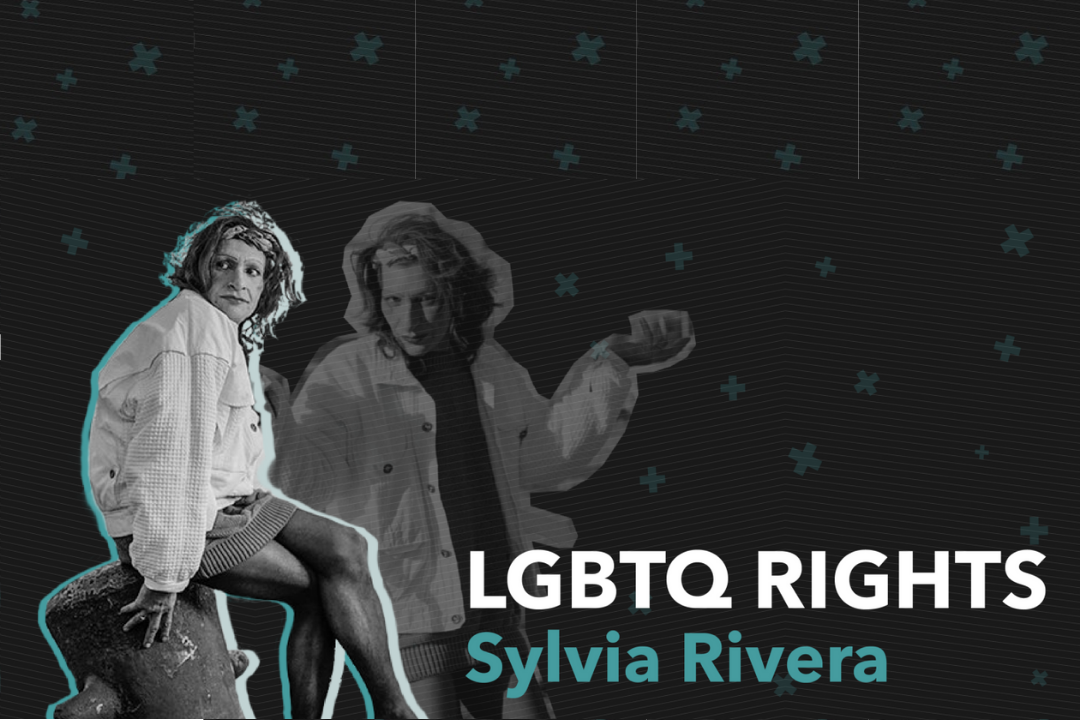Written by: Dayani Guevara, Cisneros Class of 2024
[TW: mentions of suic*de, anti-LGBTQ violence]
For much of the Gay Liberation movement, those on the margins of the LGBTQ community — transgender/gender non-conforming people, homeless queer youth, and queer people of color — often found themselves shunned and not taken seriously. Unfortunately, not only were a lot of these members excluded from society at large, but also the LGBTQ community. Sylvia Rivera, a self-identified drag queen of Puertorican-Venezuelan descent, was among the first to fight for the rights of these ostracized members of society.
Sylvia Rivera, born “Ray Rivera,” led an extremely tumultuous life. When she was three years old, her mother died by suicide, leaving Sylvia alone with her abusive father. When she was in the 4th grade, Sylvia moved in with her grandmother. It was at this time that she began to express herself through makeup. Disapproving of her effeminate appearance, her grandmother kicked her out of the house when she was only 10 years old. Homeless and having no one to turn to for help, young Sylvia was forced to enter into sex work in order to survive. Eventually, a group of drag queens befriended her and renamed her Sylvia.
When asked about her gender identity, Sylvia would often say: “I just want to be who I am. I am Sylvia Rivera. Ray Rivera left home at the age of 10 to become Sylvia. And that’s who I am.”
Though Sylvia is most known for participating in the 1969 Stonewall Riots, Sylvia’s activism began when she met Marsha P. Johnson in 1963. Marsha was a transgender activist who shared the same passions as Sylvia and they formed a friendship and an impactful political partnership. Throughout her activism, Sylvia battled with substance abuse, mental health, and homelessness; however, it never deterred her from participating in marches, demonstrations, and even organizing speeches to spread awareness of the LGBTQ plight. One of Sylvia’s greatest accomplishments is co-founding STAR, Street Transvestite Action Revolutionaries, which aimed to help queer and homeless youth receive legal aid, housing, and other much-needed services.
In spite of being a leader for the cause, Sylvia was often mistreated within her own community. Scheduled to give a speech at the Christopher Street Liberation Day Rally in 1973, Sylvia was blocked from walking on stage and accused of “mocking womanhood.” Once on stage, she was greeted by a chorus of boos. It is at this time that she gave her most impassioned speech, “Y’all Better Quiet Down.”
“You all tell me, go and hide my tail between my legs.
I will no longer put up with this shit.
I have been beaten.
I have had my nose broken.
I have been thrown in jail.
I have lost my job.
I have lost my apartment.
For gay liberation, and you all treat me this way?”
Feeling defeated after the rally, Sylvia had a breakdown, disbanded STAR, and left activism for two decades.
Tragically, in 1992, Marsha P. Johnson was found dead in the Hudson River. Though Marsha’s death was ruled a suicide, there seemed to be foul play involved. Distraught with grief, Sylvia said, “When she died, part of me went with her.” It was after Marsha’s death that Sylvia returned to activism with her fallen sister in mind. She re-started STAR, and dedicated herself to the fight for equality once more. Finally getting the recognition she deserved, Sylvia was given a place of honor at the New York City Gay Pride march marking the 25th anniversary of Stonewall.
“The movement had put me on the shelf, but they took me down and dusted me off,” Rivera told The New York Times in 1995. “Still, it was beautiful. I walked down 58th Street and the young ones were calling from the sidewalk, ‘Sylvia, Sylvia, thank you, we know what you did.’ After that, I went back on the shelf,” — Sylvia Rivera
Sylvia Rivera died in 2002 from liver cancer. Fighting until the end of her life, Sylvia is remembered for not only advocating for the LGBTQ community but for working to ensure that all people were given the respect and recognition they deserved. To this day, Sylvia’s ashes reside at the Metropolitan Community Church of New York where she worshipped and worked in the food pantry. The Metropolitan Community Church of New York has since renamed their food pantry after Sylvia and opened a queer youth homeless shelter on her behalf. Every Sunday, Sylvia’s ashes are brought out for mass and dinner. This is a testament to the powerful impact Sylvia had — and continues to have — on her beloved community.
Dayani Guevara is a first-year Cisneros Scholar in the Elliott School of International Affairs. From Fort Wayne, Indiana, she is pursing international affairs and is part of GW’s Women’s Leadership Program. Dayani’s views are her own and not necessarily reflective of the Cisneros Institute.


